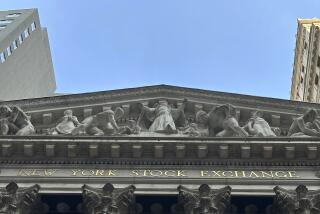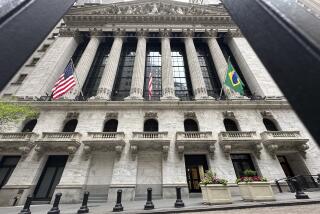Profit Shortfalls Hitting Financial, Oil Sectors Hard
- Share via
At the core of the stock market’s meltdown is faltering profit growth for U.S. corporations--whether at the hands of drooping commodity prices, economic turmoil overseas or the U.S. dollar’s strength against foreign currencies.
Nothing prompts knee-jerk selling by investors like a company’s announcement that its upcoming earnings will fall short of earlier forecasts, and those disclosures--and the selling--have been building all summer.
Among the latest victims is Procter & Gamble Co., whose stock was battered this week when the consumer products giant disclosed unexpectedly sluggish results.
The major banks, brokerage firms and other financial services companies have suffered the biggest markdowns of their profit outlooks lately, according to data compiled by First Call Corp., a Boston tracker of earnings estimates of Wall Street analysts.
First Call looked at the period from July 1--just two weeks before the stock market peaked--through Sept. 5 to measure changes in the sectors’ earnings forecasts during the buildup of the economic woes overseas and the massive drop in the stock market.
If anything, many of those estimates were reduced even further this week in the face of the market’s ongoing turmoil, said Charles Hill, First Call’s director of research. Most companies will report their quarterly earnings in the next few weeks.
Several sectors have held up relatively well in analysts’ forecasts. Home builders, building materials companies and retailers--both apparel retailers and so-called broad-line retailers such as the big discount and department stores--are not seeing sharp downward revisions of their earnings forecasts, First Call’s data showed.
Their strength is tied to robust domestic consumer spending, analysts said. “Home building has been propped up by lower interest rates, and consumer demand for goods is still strong,” said Mitchell Held, an economist at Salomon Smith Barney.
But the overall outlook is much worse. Held just cut his average 1998 earnings estimate for the companies that comprise the bellwether Standard & Poor’s 500- stock index to a paltry 1.5%--and he’s looking for them to suffer an average profit drop of 1% next year.
That’s bad news for investors who hope that a quick rebound in earnings growth will again lift the stock market toward the record highs it reached in mid-July.
Why? The economic woes in Asia, Russia and now Latin America “will have a negative impact on U.S. economic activity” and make it harder for U.S. exporters to raise prices to help their profit margins, Held said.
Workers’ wage gains, meantime, are going to remain strong--adding to U.S. companies’ operating costs--because employment remains high.
Also, the “unsettled financial markets will wreak havoc on earnings of financial companies,” Held said. Financial stocks are the most heavily weighted sector of the S&P; 500, accounting for about 20% of the measure, Held said.
Analysts are lowering their earnings forecasts for the moneycenter banks in large part because the banks have billions of dollars of credit exposure to Latin America and the other foreign regions that are now struggling. The brokerages, meantime, are expected to earn considerably less because of the stock market’s swoon.
All of which has sent bank and brokerage stocks plunging. Citicorp, for instance, has seen half of its stock market value--an astonishing $40 billion--wiped out in just a few weeks.
Oil companies also are high on the list of victims, because crude-oil prices have been tumbling for the last 12 months--taking Big Oil’s profits down with them. The same is true for other commodities such as steel and paper, and companies in those industries also are among the worst victims of profit erosion.
“For the providers of basic materials, you have lower overseas demand, plus increased imports to the U.S. market from Asia and Russia, which is lowering prices,” Hill said.
If the Federal Reserve Board trims interest rates further later this year, as many analysts expect, it likely would ease the pressure on the banks and give the housing-related companies an additional lift.
But it won’t be a swift antidote to the problems overseas, Hill said. “The slowdown in profit growth is going to be deeper and last longer than most people had thought, and that’s going to have negative implications for the stock market,” he said.
More to Read
Inside the business of entertainment
The Wide Shot brings you news, analysis and insights on everything from streaming wars to production — and what it all means for the future.
You may occasionally receive promotional content from the Los Angeles Times.











